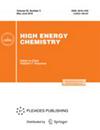通过在泛音区域(1434 纳米)的吸收对 OH 自由基绝对浓度进行时间分辨测定
IF 0.6
4区 化学
Q4 CHEMISTRY, PHYSICAL
引用次数: 0
摘要
摘要 使用波长为 1434 nm 的 DFB 二极管激光器检测第一泛音区的羟基自由基 OH。实验是在 2Π3/2 电子项的最强光线 Q(3/2) 处进行的。测量了 He 缓冲气体的碰撞展宽。利用可靠定义的该线综合强度和计算的线轮廓,可以获得不同压力下的吸收截面。这使得在时间分辨实验中无需校准即可测量 OH 的绝对浓度。通过吸收检测到的自由基最小浓度为 2 × 1012 cm-3,分辨时间约为 10-6 秒。本文章由计算机程序翻译,如有差异,请以英文原文为准。
Time-Resolved Determination of the Absolute Concentration of OH Radicals by Absorption in the Overtone Region (1434 nm)
Abstract
DFB diode laser at 1434 nm was used to detect the hydroxyl radical OH in the first overtone region. Experiments were made at the most intense line Q(3/2) of 2Π3/2 electronic term. Collisional broadening for He buffer gas was measured. Using reliably defined integrated intensity of this line and calculated line contour, the absorption cross section could be obtained for different pressures. This enables measurement of the absolute concentration of OH in time-resolved experiments without calibration. The minimum concentration of radicals detected by absorption is 2 × 1012 cm–3 with the resolving time approximately 10–6 s.
求助全文
通过发布文献求助,成功后即可免费获取论文全文。
去求助
来源期刊

High Energy Chemistry
化学-物理化学
CiteScore
1.50
自引率
28.60%
发文量
62
审稿时长
6-12 weeks
期刊介绍:
High Energy Chemistry publishes original articles, reviews, and short communications on molecular and supramolecular photochemistry, photobiology, radiation chemistry, plasma chemistry, chemistry of nanosized systems, chemistry of new atoms, processes and materials for optical information systems and other areas of high energy chemistry. It publishes theoretical and experimental studies in all areas of high energy chemistry, such as the interaction of high-energy particles with matter, the nature and reactivity of short-lived species induced by the action of particle and electromagnetic radiation or hot atoms on substances in their gaseous and condensed states, and chemical processes initiated in organic and inorganic systems by high-energy radiation.
 求助内容:
求助内容: 应助结果提醒方式:
应助结果提醒方式:


